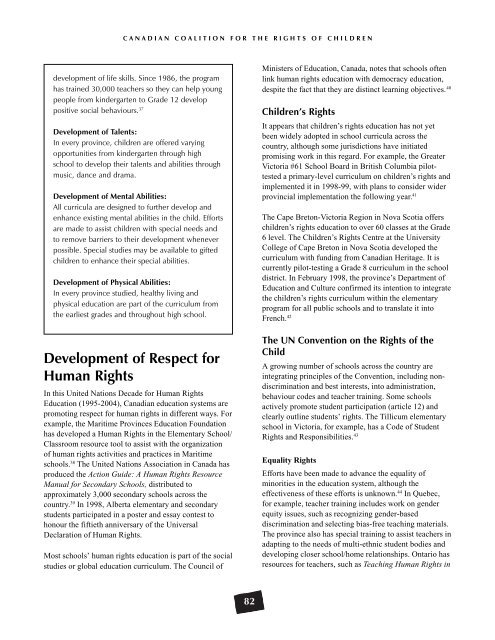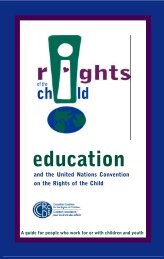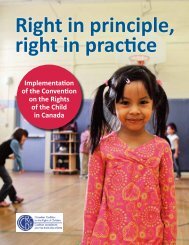Poste - Canadian Coalition for the Rights of Children
Poste - Canadian Coalition for the Rights of Children
Poste - Canadian Coalition for the Rights of Children
You also want an ePaper? Increase the reach of your titles
YUMPU automatically turns print PDFs into web optimized ePapers that Google loves.
C A N A D I A N C O A L I T I O N F O R T H E R I G H T S O F C H I L D R E N<br />
development <strong>of</strong> life skills. Since 1986, <strong>the</strong> program<br />
has trained 30,000 teachers so <strong>the</strong>y can help young<br />
people from kindergarten to Grade 12 develop<br />
positive social behaviours. 37<br />
Development <strong>of</strong> Talents:<br />
In every province, children are <strong>of</strong>fered varying<br />
opportunities from kindergarten through high<br />
school to develop <strong>the</strong>ir talents and abilities through<br />
music, dance and drama.<br />
Development <strong>of</strong> Mental Abilities:<br />
All curricula are designed to fur<strong>the</strong>r develop and<br />
enhance existing mental abilities in <strong>the</strong> child. Ef<strong>for</strong>ts<br />
are made to assist children with special needs and<br />
to remove barriers to <strong>the</strong>ir development whenever<br />
possible. Special studies may be available to gifted<br />
children to enhance <strong>the</strong>ir special abilities.<br />
Development <strong>of</strong> Physical Abilities:<br />
In every province studied, healthy living and<br />
physical education are part <strong>of</strong> <strong>the</strong> curriculum from<br />
<strong>the</strong> earliest grades and throughout high school.<br />
Development <strong>of</strong> Respect <strong>for</strong><br />
Human <strong>Rights</strong><br />
In this United Nations Decade <strong>for</strong> Human <strong>Rights</strong><br />
Education (1995-2004), <strong>Canadian</strong> education systems are<br />
promoting respect <strong>for</strong> human rights in different ways. For<br />
example, <strong>the</strong> Maritime Provinces Education Foundation<br />
has developed a Human <strong>Rights</strong> in <strong>the</strong> Elementary School/<br />
Classroom resource tool to assist with <strong>the</strong> organization<br />
<strong>of</strong> human rights activities and practices in Maritime<br />
schools. 38 The United Nations Association in Canada has<br />
produced <strong>the</strong> Action Guide: A Human <strong>Rights</strong> Resource<br />
Manual <strong>for</strong> Secondary Schools, distributed to<br />
approximately 3,000 secondary schools across <strong>the</strong><br />
country. 39 In 1998, Alberta elementary and secondary<br />
students participated in a poster and essay contest to<br />
honour <strong>the</strong> fiftieth anniversary <strong>of</strong> <strong>the</strong> Universal<br />
Declaration <strong>of</strong> Human <strong>Rights</strong>.<br />
Most schools’ human rights education is part <strong>of</strong> <strong>the</strong> social<br />
studies or global education curriculum. The Council <strong>of</strong><br />
82<br />
Ministers <strong>of</strong> Education, Canada, notes that schools <strong>of</strong>ten<br />
link human rights education with democracy education,<br />
despite <strong>the</strong> fact that <strong>the</strong>y are distinct learning objectives. 40<br />
<strong>Children</strong>’s <strong>Rights</strong><br />
It appears that children’s rights education has not yet<br />
been widely adopted in school curricula across <strong>the</strong><br />
country, although some jurisdictions have initiated<br />
promising work in this regard. For example, <strong>the</strong> Greater<br />
Victoria #61 School Board in British Columbia pilottested<br />
a primary-level curriculum on children’s rights and<br />
implemented it in 1998-99, with plans to consider wider<br />
provincial implementation <strong>the</strong> following year. 41<br />
The Cape Breton-Victoria Region in Nova Scotia <strong>of</strong>fers<br />
children’s rights education to over 60 classes at <strong>the</strong> Grade<br />
6 level. The <strong>Children</strong>’s <strong>Rights</strong> Centre at <strong>the</strong> University<br />
College <strong>of</strong> Cape Breton in Nova Scotia developed <strong>the</strong><br />
curriculum with funding from <strong>Canadian</strong> Heritage. It is<br />
currently pilot-testing a Grade 8 curriculum in <strong>the</strong> school<br />
district. In February 1998, <strong>the</strong> province’s Department <strong>of</strong><br />
Education and Culture confirmed its intention to integrate<br />
<strong>the</strong> children’s rights curriculum within <strong>the</strong> elementary<br />
program <strong>for</strong> all public schools and to translate it into<br />
French. 42<br />
The UN Convention on <strong>the</strong> <strong>Rights</strong> <strong>of</strong> <strong>the</strong><br />
Child<br />
A growing number <strong>of</strong> schools across <strong>the</strong> country are<br />
integrating principles <strong>of</strong> <strong>the</strong> Convention, including nondiscrimination<br />
and best interests, into administration,<br />
behaviour codes and teacher training. Some schools<br />
actively promote student participation (article 12) and<br />
clearly outline students’ rights. The Tillicum elementary<br />
school in Victoria, <strong>for</strong> example, has a Code <strong>of</strong> Student<br />
<strong>Rights</strong> and Responsibilities. 43<br />
Equality <strong>Rights</strong><br />
Ef<strong>for</strong>ts have been made to advance <strong>the</strong> equality <strong>of</strong><br />
minorities in <strong>the</strong> education system, although <strong>the</strong><br />
effectiveness <strong>of</strong> <strong>the</strong>se ef<strong>for</strong>ts is unknown. 44 In Quebec,<br />
<strong>for</strong> example, teacher training includes work on gender<br />
equity issues, such as recognizing gender-based<br />
discrimination and selecting bias-free teaching materials.<br />
The province also has special training to assist teachers in<br />
adapting to <strong>the</strong> needs <strong>of</strong> multi-ethnic student bodies and<br />
developing closer school/home relationships. Ontario has<br />
resources <strong>for</strong> teachers, such as Teaching Human <strong>Rights</strong> in




